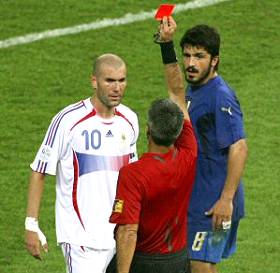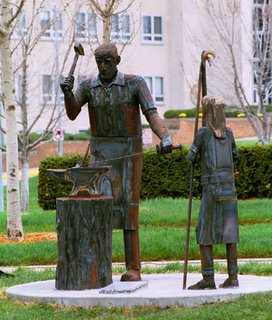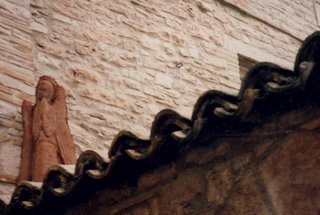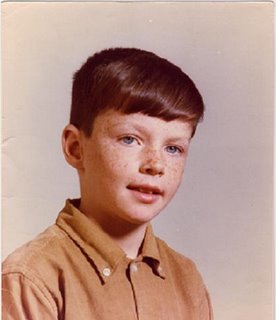 Jeff, AKA "Freckle-Faced Strawberry", circa 1967
Jeff, AKA "Freckle-Faced Strawberry", circa 1967Sorry I’ve been away so long. I’ve been pretty busy, plus I’ve been working on this rather lengthy post.
Several authors and other writers have written on this theme far better than I ever could, but I’ll take a shot at putting down some memories as well, because I was born during an interesting period of time.
I’ve noticed that some bloggers are a little older than me. The vast majority are much younger. A lot are converts. I think I might have some interesting perspective to add with my recollections, merely because of the niche that I fell into due to the year in which I was born. I've not only lived in the same community since 1962, but the same house and the same parish. My childhood coincided with the events of the Second Vatican Council. Therefore, my catechesis was a mixture of pre-conciliar and post-conciliar teaching, although I’d have to say that most of it was actually pre-conciliar. No one really knew how to implement that Council. The ship didn’t turn around overnight. There’s no way that a 2000-year-old institution can. Things just coasted along for a while as they always had. Some people wanted things to change. Some people wanted nothing to change. Some people wanted to change, but didn’t know how. Some people didn’t care or notice that anything had changed at all. Eventually things did change, but hardly in the ways that anyone had expected. My entire Catholic life has been the experience of Vatican II, in which I am still a firm believer and supporter.
The 1960s were a fascinating and exciting time to be a kid. Not only were there changes in the Church, but there were enormous changes in the culture all around. The Beatles and Rock music, the Civil Rights movement, the space program and the race to the moon, hippies, flower power, psychedelia, and of course, the shadow of Viet Nam hung over everything. The excitement of the 1960s turned into the disillusionment and vapidity of the 1970s. Viet Nam and Watergate
weakened trust and respect for authority and institutions in all aspects of life. The Civil Rights movement seemed to lose its moorings after Dr. King was assassinated. Drugs seemed to have taken all of the promise out of the progressive youth movement, and progress in women’s rights had stalled and run into an enormous fissure over abortion. People seemed to stop looking outward and the 1960s optimism dried up as people became self-absorbed and turned inward. The 1970s were a tough time to be a teenager.
However, around the time of my birth and early childhood…
The Catholic Church in America is at the zenith of its golden age. In Boston, the Church is led by Richard Cardinal Cushing. The tone is militant and triumphant. The typical priest in our archdiocese is of a tough, masculine, Irish mold. They have the combativeness and the no-nonsense approach of their hero and model, Bishop Fulton Sheen. Outwardly, the Church is full of confidence. In the words of the late William Cardinal O’Connell, “The Puritan has passed. The Catholic remains.” On the other hand, it is prickly, with lingering feelings of inferiority and resentment over past prejudices and sleights. Again, in the words of O’Connell, “I’m a proud American man, and a Catholic. What about it?” The Catholic Church in America is at its height, and one of its own from Boston, John F. Kennedy, is about to be elected president. These are heady days. We have finally arrived and made it in this country.
Backing up a little bit….
My family, mostly Irish, but with some Italian thrown in on my mother’s side, was dominated in its thinking by two things. The first was its immigrant roots. Ethnicity, even among fellow American citizens, was always noticed and commented on, from childhood friends to the girls you dated later on. “Oh, Delorey… That’s that French kid you hang around with.” “What did you say her last name was? What is that? Polish?” This is not unusual at this time and place in history.
The second thing was the crucible of the great Depression of the 1930’s. The Depression had such a profound effect on my family and its attitude toward the uses of money, work, and mutual responsibility, it is hard to underestimate the impact of it. I’m still affected by inheriting some of it, much to the chagrin of my wife and kids.
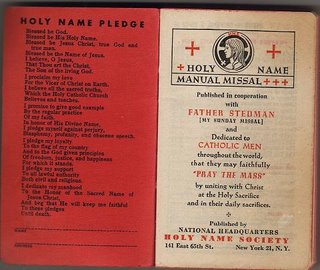 My Grandpa Doherty’s Holy Name Society Missal, 1945.
My Grandpa Doherty’s Holy Name Society Missal, 1945.
Grandpa’s advice to us – “Don’t ever vote for a Republican. They’d leave you without a pot to p*** in.”My father was from a big Irish family in Somerville that always wanted to get out of there. My father was tough but with a sensitive side. He had a way with written and spoken words and had big dreams. In 1945 he tried to join the Marines at the age of 16. By the time the Korean War came around in 1950, he had other ideas. He was much more interested in college at Tufts University, but rather than waiting to get drafted, he enlisted in the Army and went into Officer Training School. My father never missed a Mass that I know of, but he didn’t talk about religion much. He worked as a valued copywriter and creative director for several Boston ad agencies, but the pressure and cut-throat nature of the ad business caused a lot of stress on him and took a toll.
My mother was from the urban melting pot of the West End of Boston. My mother was a devoutly Catholic woman, but on her own terms. She turned out to be a progressive later on in a lot of ways, and I suppose that came from being a nurse and seeing lots of hard cases (abused children, unwed mothers, etc..), but years later she said she always missed the "mystery" of the Tridentine Mass and always stuck to her private devotions she'd learned so long ago from the Sisters of Notre Dame who'd educated her. On the other hand, those Sisters at St. Mary’s High School in Cambridge were never able to break my mother’s defiant spirit with their corporal punishments… “I don’t care why the length of side A doesn’t equal the length of side B (thwack!) I don’t care! (thwack!) I … don’t …
care….”
In the late 1950s, devotions are still very important in Catholic life. My mother and my aunt (my mother’s sister-in-law) live according to First Fridays and the Novena of Grace to St. Francis Xavier. All of the boys in my cousin’s family will be given the middle name of Francis. My brother and I will be given the middle name of Xavier, so that no one will confuse us with being named after the great man from Assisi (For my whole life, this has been a litmus test for me as to who is Catholic or at least familiar with Catholic culture. Whenever someone is completely flummoxed by my middle initial of “X”, I know there isn’t much Catholic literacy there).
Novena Of Grace of St. Francis Xavier
We have come together to worship the Lord our God and to honor the memory of His great missionary, St. Francis Xavier. Through his powerful intercession, let us pray for ourselves, for the missionary efforts of the church, and for all the People of God.
For missions and missionaries throughout the world,
that through the proclamation of the Good News of salvation, all people may come to know the one true God and Jesus Christ whom He has sent.
Let us pray to the Lord: Lord, hear our prayer.
For the Church, that renewed by the Holy Spirit, she may show forth to the world the mystery of the Lord and be an instrument of redemption for all.
Let us pray to the Lord: Lord, hear our prayer.
For Christian unity, that the Spirit of Christ, dwelling in all who believe, may bring us to that fullness of unity which Jesus desires -- one Lord, one faith, one baptism.
Let us pray to the Lord: Lord, hear our prayer.
For the unrepentant,
that moved by God's loving mercy revealed in Jesus,
they may repent their sins and open their hearts
to the divine life of grace.
Let us pray to the Lord: Lord, hear our prayer.
For ourselves, that we may be ever faithful to our baptismal commitment to Christ, and bring Christ's word and Christ's love to the world in which we live.
Let us pray to the Lord: Lord, hear our prayer.
Lord God, our Father, we honor the memory of the Apostle of the Indies and Japan, St. Francis Xavier. The remembrance of the favors with which You blessed him during life and of his glory after death fills us with joy; and we unite with him in offering to You our sincere tribute of thanksgiving and of grace.
We ask You to grant us, through his powerful intercession, the inestimable blessings of living and dying in the state of grace. We also ask You to grant us the favors we seek in this novena.
But if what we ask is not for the glory of God and the good of our souls, grant us, we pray, what is more conducive to both. We ask this through Christ our Lord.
Amen. I remember my mother and my aunt dragging me from church to church, letting me light those candles wherever we went. "Here's a dollar to put in the box. Who would you like to pray for? Hail Mary, full of grace…" Catholic Churches seem cavernous and cool and welcoming on a hot day, filled with votive candles, marble, and fleshy paintings.
I’m getting trained for Church before I even enter one. Over and over, I am shown a triptych, and as I open the doors of it, there is a glow-in-the-dark image of Jesus inside on the central panel. I think it might even been one of those things where the face in the image opens and closes its eyes as you move it. “That’s Jesus…Shhhhhh… Shhhhhh”. The most important thing I am to take away from this is that Jesus is very holy and very sacred and that I must be quiet, very quiet in Church. At Mass, the priest has his back turned, and I can barely hear or understand what is being said. I’m on my knees with my hands resting on my arms on the lacquered pew, or I’m sprawled among everyone’s feet and legs on the kneelers. “I want to go home… When is it going to be over?”
In our town, Monsignor Louis Cunney has been the pastor at the parish since 1951. Stern, serious, cassocked, and unapproacheable. I don’t recall ever speaking to, or being spoken to by him.
The hymn, I remember being sung most often:
To Jesus Christ Our Sovereign King
To Jesus Christ, our Sovereign King,
Who is the world's salvation,
All praise and homage do we bring,
And thanks and adoration.
Refrain:
Christ Jesus Victor, Christ Jesus Ruler!
Christ Jesus, Lord and Redeemer!
Thy reign extend, O King benign,
To every land and nation,
For in Thy kingdom, Lord divine,
Alone we find salvation.
(Refrain)
To Thee and to Thy Church, great King,
We pledge our hearts' oblation,
Until before Thy throne we sing,
In endless jubilation.
(Refrain)Our catechesis is the Baltimore Catechism. Distinctions between mortal and venial Sins are crucial. Lots of actions are mortal sins, but no sin can be mortal, unless you know it is seriously wrong and you do it anyway, on purpose.

The one that is always mentioned at the top of the list is missing Mass. Intentionally missing Mass is a mortal sin. Even worse, if you do go to Mass, and you receive communion with a mortal sin on your soul, that is a mortal sin as well. If you die with a mortal sin on your soul, just one, you will go to hell. Although it is rarely spoken about anymore, the Church has never changed its teaching on this.
In my missal it says:
The worst thing in the whole world is mortal sin. It kills the divine life in your soul and makes you deserve to suffer in hell. After mortal sin, the next worst thing is venial sin. Some young persons and even old ones care nothing about venial sin. "It is only a venial sin" they say, "and venial sins do not make you deserve to suffer in hell." How stupid ! Persons who do not try to keep out of venial sin find it hard to keep out of mortal sin. And besides, who wants to suffer in Purgatory for being careless about venial sins ? Be smart ! Try to keep out of all sins-mortal and venial.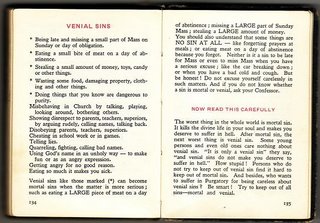
Preparation for our first Confession is lengthy and serious. I think we spent more time on prep for this than we did for our First Communion. Examination of conscience… List the sins by category and number… “Bless me Father for I have sinned. It has been two weeks since my last confession.” One Saturday afternoon I’m in a fury because my brother and sister are laughing at me and teasing me. From the pews they’d heard me saying to the priest in the confessional, “I used the Lord’s Name in vain no times at all.”
My brother is breathlessly telling a story: “Did you hear what happened at CCD today? Some kid in the communion preparation class took a practice host out of his mouth and looked at it. Cunney grabbed him and threw him right through the door out into the hall….”
My First Holy Communion. May 13, 1967
The sisters had drilled us to get ready for First Communion. This is serious business, and we are told what to wear with no exceptions. The boys are all to dress in a crisp white shirt, black pants, spotless, shined shoes, and a cloth scapular. Through long hours of drill, these women have been able to train us wild little Irishmen into disciplined ranks of well-trained soldiers for Christ.
Afterwards, there is a celebration in the Parish Hall. We receive our metal scapulars and have a great breakfast. I recall that someone from the archdiocese had brought in a relic of what was claimed to be a splinter of the True Cross. It was a great day.
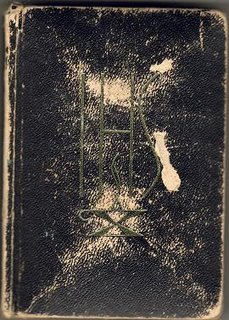 The Missal I was given on my First Communion.
The Missal I was given on my First Communion.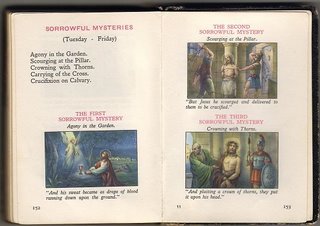
In order to take Holy Communion, you needed to fast from midnight on. For a kid, that essentially means fasting from dinnertime on Saturday night. I tell my own kids now not to complain about the current one-hour rule.
I own one blue suit, and that is what I wear to Mass every Sunday. The suit has a reversible vest. One side matches the suit, and the other side is light with a checked pattern. I alternate how I wear the vest each week. I have a few clip-on ties. Formal dress is the norm at Mass. Every guy wears a suit, or at least a tie and blazer. Women wear dresses and hats. It was a much more formal time. Casual wear or shorts never would have even been considered. I saw an episode of Classic Sports not long ago of a World Series game in the 1960’s. All of the fans were wearing white shirts and ties. In the 1970’s, everything turned around on a dime regarding this.
Holy Communion is received on the tongue over a paten, kneeling at the altar rail. You wouldn’t dream in a million years of ever touching the consecrated host with your hands. Unthinkable. The first time I saw it happen, I was stunned. Although I’m not one of those who considers communion in the hand a sacrilege (and I really appreciate being able to receive the cup), and although I receive and give out communion in the hand as an EOM, I do believe that the old way was better. I think a lot of reverence for the Eucharist has been lost, and even from a logistical point of view, this was preferable. If there is one matter in which I would long for a return to tradition, this would be it.
As much fun as Christmas is for kids, I just love the Lenten season, and I love it even as a child. One of the memories that sticks with me most vividly is how everything was covered with purple cloth during Lent. The statutes, the Stations, the big crucifix over the altar… everything had a specially-fitted purple covering that went over it. A lesson should be learned from that. Symbols are very powerful, and they stick in the minds of children forever. Important to keep in mind when considering the liturgy.
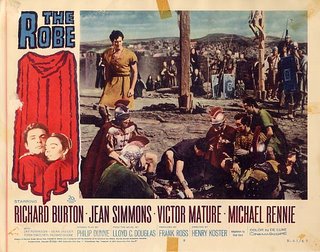
We have the day off from school on Good Friday, but it’s not your typical day off from school. There is no running around, no playing inside or outside, and no board games. It is a day to be kept solemnly, particularly around 3:00 PM, when we are reminded to be silent and prayerful. There is no TV allowed either, at least not until the late afternoon, when they start showing the Bible epics and other religious movies. I love these flicks… Richard Burton and Victor Mature in
The Robe, Anthony Quinn in
Barabbas, Charlton Heston in
Ben Hur, Max Von Sydow in
The Greatest Story Ever Told, Jeffrey Hunter in
King of Kings. During the year there are a few Catholic-oriented movies that are regularly on TV –
The Nun’s Story, Boy’s Town, San Francisco, Going My Way, Angels with Dirty faces, The Sound of Music, and the
Miracle of Our Lady of Fatima. The last movie, and in fact, the whole Fatima story, was and still is unnerving and disturbing to me, and contrary to everything else I had ever been taught about Mary. The thing I remember the most about the movie was the provincial administrator threatening to boil the children in oil if they didn’t divulge the Fatima secrets.
On Holy Saturday we spend hours dipping hard-boiled eggs into colored dyes for our easter egg hunt. Great fun. I can still remember the white vinegar smell vividly.
When you took home some palms on Palm Sunday, that was really something…Thick, heavy, scentful palms that seemed like an entire frond for each individual. Compared to what you get now, it was like taking home half a palm tree per family.
On Easter Sunday morning, I’m always hoping against hope that I’ll get a huge solid chocolate rabbit, but it’s always a chocolate-covered coconut egg. I’m not crazy about coconut. It takes me weeks to gnaw my way through it. Sometimes we get those sugar eggs with the windows and the small chick inside.
The nuns who teach us CCD are good teachers and they are always throwing in little extras for us as far as the Mass is concerned. I follow their suggestions to this day… “When the priest lifts up the Body of Christ, pray to yourselves silently, ‘Jesus I love you’. When the priest lifts up the cup, pray to yourselves, ‘My Lord and My God’. When you pray, ‘Lord I am not worthy that you should come under my roof, speak but the word and my soul will be healed’, pray it silently to yourselves three times afterwards.”
One well-meaning but slightly cracked sister tells us that the light emanating from the Body of our Lord is so bright, that if you should look at the light from the tabernacle when the priest opens it, it could blind you. Freddy and I shield our eyes for months afterward at this point in the Mass. It is basically the same thing we’ve heard in the public school regarding a solar eclipse.
I’m not sure what year Father P. arrived, but he got everyone’s attention in a hurry. He could startle you at the beginning of Mass with a booming, nasal “In the NAME of the FATHER, and The Son….”. He was a stout, abrupt man with round glasses. In terms of style, speech, mannerisms, appearance, and probably his theology, he was remisniscent of the “Radio Priest” of the 1930’s
Father Charles Coughlin (play the audio clip = You
want that. You
voted for that. You
have that, and it’s time that you
take that.”)
One Sunday, Freddy and I are clowning around and talking during CCD. The Sister hauls us out of class and takes us down to see Father P. “Give me you last names”, he barks at us. We tell him, and he rattles our home addresses back at us, rapid fire. We’re absolutely amazed and dumbfounded. He knows
everything! “I know your parents. They’re good Catholics… What would your mothers and fathers say if they knew what shenanigans you were up to in CCD class?". We hardly know what to say. “Sorry Father. It won’t happen again, Father…”
One day Father P. asks the girls to leave the CCD class with the nuns for a while. He wants to have a word or two alone with just the boys… He’s going to straighten the lads out a little bit.
“What is God’s name?”
We glance at each other, a little bit confused. The sisters had taught us that you weren’t supposed to say God’s name. A few suggestions come out… “Yahweh?” “Jehovah?” “Jesus?”
Father P.’s answer is: “Hallowed.... Our Father who art in heaven,
Hallowed be Thy name….”
Now we’re really confused. We know that hallowed means sacred. Is Father trying to tell us that God’s name is too sacred to say, or does he really think that “Hallowed” is a name? To this day, I’m still trying to figure this one out
“Boys, what swear is a serious, serious sin?”
We all look at each other again. Is Father really asking us to
swear here in CCD class, right in front of him?? Giggling nervously, a few of us start by trying out the usual potty words.
“No, that’s not a sin… No, no, not that one either. Scatalogical reference… No, that is scatalogical as well….” He’s waiting, and we all know what he’s waiting for.
Finally, one of the oldest, biggest kids in the class has the temerity to meekly try out the bomb…
“F___?”
“
THAT’S it!!
THAT’S the
ONE!! THAT is the
ONE word you must
NEVER Say!!!”
One of the nuns is young and pretty and smiles all the time. We just love her. She’s nice all the time, plays the guitar and sings, and she teaches us hymns like
Michael, Row the Boat Ashore. No, I don’t think we did
Kumbaya. I think we might have been a little too old for that. I think the older nuns worry about her a little bit, particularly several years later when she’s playing the
Jesus Christ Superstar album over at the convent. I wonder whatever became of her. I wonder if she stayed.
It’s rare for kids to hear Mass with their parents. On most Sundays, the adults are in the upper Church, and the kids are in the lower Church in the basement. Girls are on one side, and boys are on the other. The sisters and lay volunteers walk up and down the aisles, making sure we’re not talking and that we are paying attention. Every once in a while Father P. stops himself during Mass and tells us to keep quiet.
Mike Fitzpatrick is knuckling the back of my head and shoulders from the pew behind me. “Connors, I’m going to kick you ass”, he hisses. “You’re dead tomorrow at school.”
“OK Fitz. I guess I’ll see you after school, then.”
On Monday, nothing happens, but it was not at all unusual for guys back then to settle things with their fists on the playground after school. No one is the public school administration seemed to know about it or particularly care. No suspensions, no psychologists…. There was the odd chance that a male teacher would come out and break it up and growl at everyone to “knock it off.”
One of my best friends in the neighborhood is Scott. He’s Jewish. His mother is an attractive blonde woman, a convert. His father is a big, burly man with a goatee, militant in his Jewishness, and intensely proud of Israel’s lightning victory in the Six-Day War. I think he’s really cool, because they have a leopard-skin rug in their living room made out of an animal Scott’s father had bagged on a safari in Africa. One day my brother and I came over to their house looking for Scott and his brother. I think it must have been a Jewish holiday, because we were left waiting outside for a long time on the doorstep while Scott’s mother gave them a long (and audible to us) lecture about their Jewish identity and their lack of deportment acknowledging it. Scott and I like to play for hours and hours and to talk about the various TV shows we’d seen the day before. One December day I ask him if he’d seen the new animated feature,
The Little Drummer Boy. He replied “I don’t watch that Christian crap.” That stings, but I don’t hold it against him, because I think I’m hearing his father talking.
Several years later, Scott and his family have moved to a different neighborhood in town, but Scott has come by for a visit. We’re wrestling in my front yard, and I have him pinned. He can’t move, and we’re both laughing. “Say your prayers”, I say. Then, inexplicably, I add “Oh, I forgot. You don’t pray.” The laughing stops instantly, and Scott glares at me, his eyes flashing in absolute fury. He springs up to his feet as if I weigh nothing and he is on his way out. Realizing immediately what an offensive and stupid thing I’ve said, I apologize profusely and beg him to forgive me. He’s having none of it. We never saw each other again.
Summer days seem to last forever and the nights are steamy and full of mosquitos until the sprayer trucks come around, billowing huge clouds of insecticide. No one has any A/C yet on our street full of Cape houses. Some of my friends on the street have some cousins from the South up visiting for a week. One hot night we’re running around, ranging through the back yards of the neighborhood with our shirts off. The oldest brother in the Southern family asks me what I have hanging from the chain around my neck. I show him my scapular. “Ah, y’all are Cat-licks. We’re Christians.” I’m puzzled by this. “What do you mean? We’re Christians too.” He then instructs me in all sincerity, without a hint of of malice, “No, no… See, you all are
Catholics. We’re
Christians.”
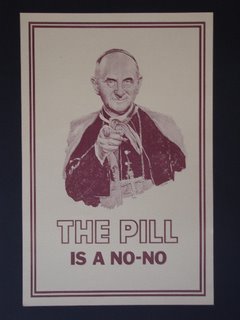
Google Image Search is an amazing thing. I doubted I was going to be able to find an image of this poster, but there it was… My mother had this poster hanging up inside the door of the closet in my parents’ bedroom. One day I asked her what it meant, and she laughed and told me in a non-explicit way. Knowing my mother’s sense of humor, this poster is the kind of thing she would have found funny, although I think she was surprised that Pope Paul came down with his decision on this the way that he did. I think she thought (along with a lot of other people) that he was going to follow the advice of his hand-picked commission and go the other way. My father had a pretty good sense of humor, but I sometimes wonder if he thought the poster was funny.
In 1971 Monsignor Cunney died suddenly. His body lay in state in the Church for a few days, the first deceased person I had ever seen.
The Age of Aquarius isn’t going down too well with Father P. at all. He seems more and more frustrated and agitated as time goes on. He just doesn’t know what the heck is wrong with young people nowadays. As we’re heading towards adolescence he blurts one afternoon, “Girls, don’t ever let the boys touch you. Boys, don’t touch the girls and don’t touch yourselves either!"
I don’t have any recollection of when the Mass started being said in English. I don’t recall any particular sense of outrage. I think most people were happy about it. If there was some resentment about it, I didn’t catch it, but that doesn’t mean there wasn’t any. I learn years later that the parish has deep divisions in it. Factions had apparently formed, and the atmosphere among some groups of adults was tense and bitter.
In 1971, a new Father P. arrives at the Parish. He remained the pastor until 1993. I only regret that it took me so long to realize what a treasure this man was. He was the finest priest I’ve ever known. He left in 1993, but returned to stay in residence from 1996 until he passed away in 2004. In addition to be a man of deep spirituality, pastoral skill, wide interests and intellect, he was a model of a priest who believed in collaborative ministry and consultation with the laity. The parish flourished under his stewardship.
By the time I finished up my CCD years, the Baltimore Catechism had started getting phased out of what was now being called Religious Education. I have to say that although there was a lot that I loved about the Catholicism of my childhood, a lot of it was fear-based rather than grace-based. In this respect, Vatican II was a great blessing, applied and understood in the proper context. The group of kids who came up directly after us, however, were the victims of a pendulum that swung too far in the opposite direction. In order to get away from this fear-based teaching, the teachers overcompensated too far the other way. As for the kids, theirs was the generation of smiley –face catechesis, are-you-running-with-me-buddy-Jesus, God is Love, God Is Love, God is Love, over and over again in word-search puzzles. Their knowledge of the faith was negligible, which is tragic. I am thankful to my parents, both incarnations of Father P., and to the sisters, that at least I had that knowledge base.
In my teens and twenties, through various struggles with the flesh and with the intellect, I think the fact that I always kept going to Mass every week throughout it all is probably the thing that is most responsible for why I kept my faith. It was like that old Dan Fogelberg song
Hard To Say - “You’re faithful to her in your careless way, and so you miss her when she's far away, but every time you think you’ve got it straight, you fall.” Maybe that fear of mortal sin associated with missing Mass wasn’t such a bad thing after all. Maybe there was some deep old wisdom in that emphasis. Even when I was living in such a way that my conscience wouldn’t allow me to go up to receive communion (and that went on for years), I still kept going to Mass every week. Thank God for it. Nevertheless, I am a believer in Vatican II and what it did for the Church, reversing the grip of anti-modernist zealots over the Church who had squelched the faith in Europe and would have done the same in the USA eventually. While there was much I loved about that pre-conciliar Church, the post-conciliar Church is better. I wouldn’t want to go back. As it says in the writeup for the history of my parish:
The Second Vatican Council examined both the Church's internal life and her relationship with the world. When the Council ended, the reforms and changes went far beyond what anyone had anticipated and called all of us to a new, shared responsibility in carrying out the mission of the Church. Few aspects of Church life were unaffected. On the level of the parish, these changes were most profoundly experienced in its worship and especially the celebration of the Eucharist. What had been a very passive experience now invited the congregation to be fully involved.










